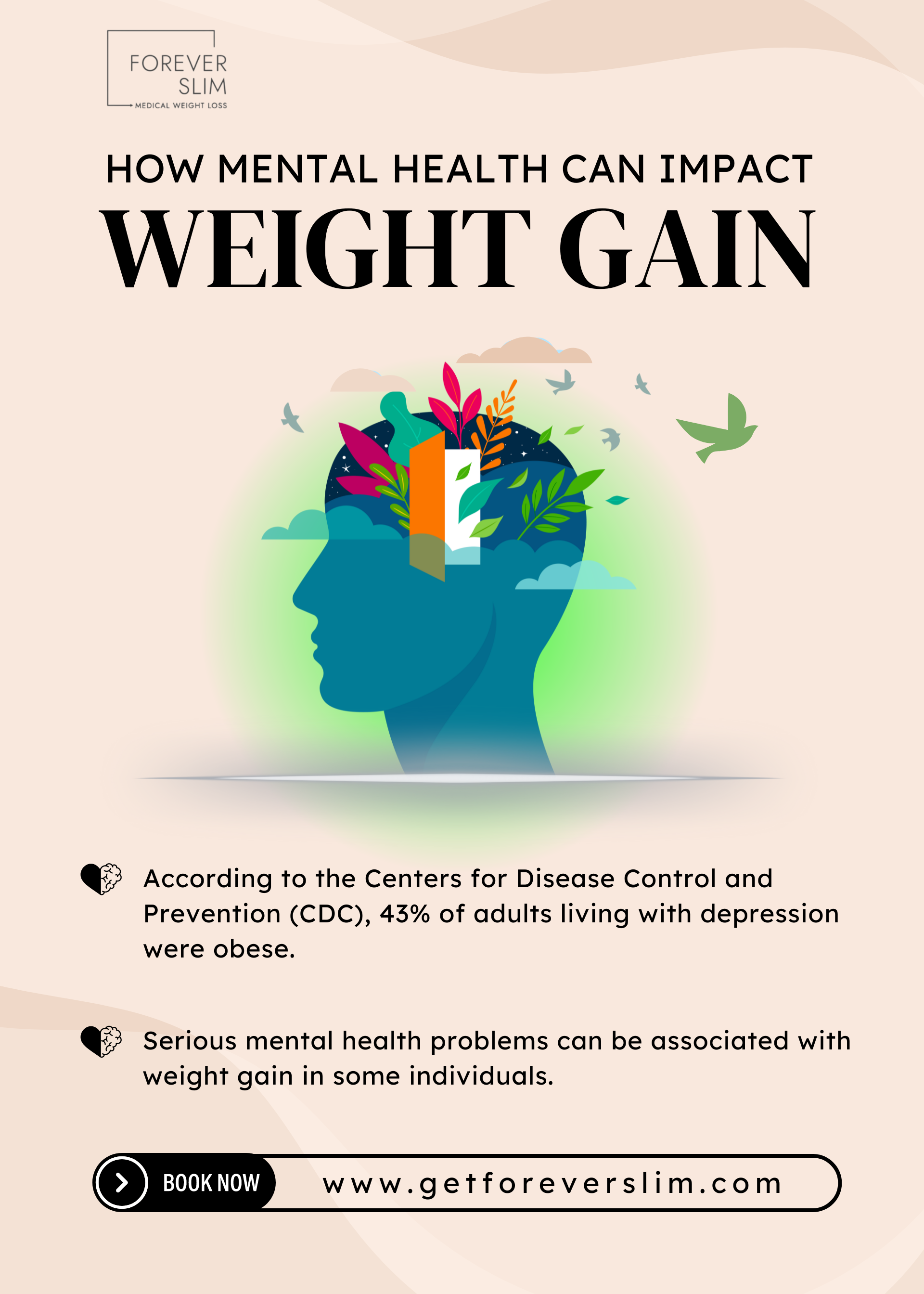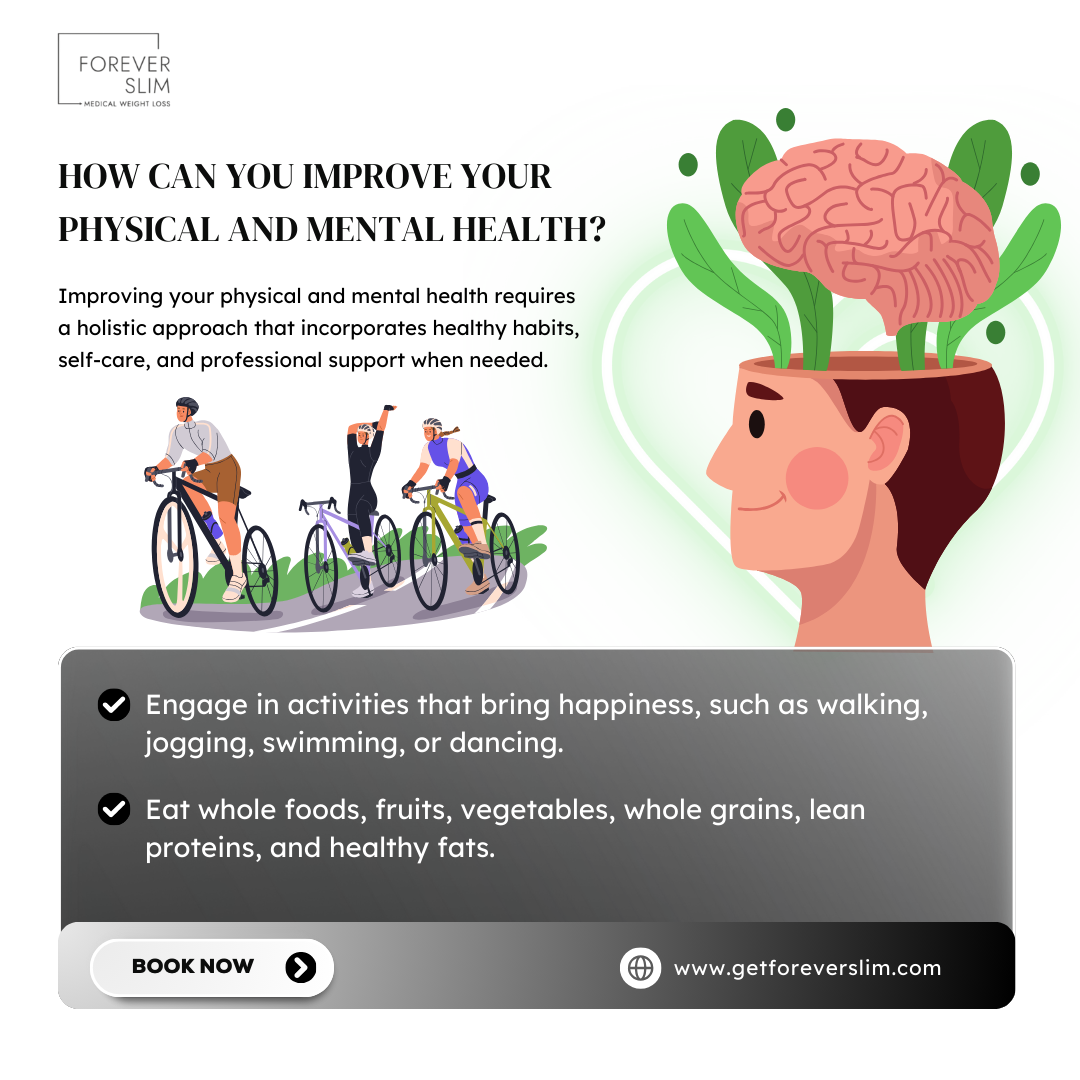
Mental and Emotional Benefits of Losing Weight Little Elm, TX
There are numerous mental health and emotional benefits linked to weight loss. Losing weight helps improve your sleep, energy, vitality, mood, and general well-being. All of these can have a significant impact on your confidence, body image, and social life.
Weight loss also helps manage many of the chronic conditions that can contribute to depression and other mental illnesses. Losing weight will not only help you live healthier and improve your self-image, but it can also provide a powerful sense of accomplishment, which motivates you to lose more weight and keep it off.

According to the Centers for Disease Control and Prevention (CDC), 43% of adults living with depression were obese. Serious mental health problems can be associated with weight gain in some individuals.
A person with poor mental health may experience difficulty in sleeping, which can result in weight gain by slowing down metabolism and increasing appetite.
Adults who are depressed or suffer from any other psychological disorder may lack the energy or desire to exercise or take part in physical activities, which sets the stage for weight gain. Serotonin deficiency linked with mood disorders can result in strong carbohydrate cravings and weight gain.
How Losing Weight Can Impact Mental Health
The various ways losing weight can impact mental health include:
Improve Self-Esteem and Body Image
Most people attach their self-esteem to their appearance, which is often reinforced by positive and negative responses to body weight.
Working through the self-esteem and body image issues you may be experiencing to reach your weight goals will result in giving yourself more self-confidence, positive body image, and a much better outlook on your life. Personal happiness with your body image is vital to your overall well-being, and weight loss can help achieve that.
Reduce Symptoms of Depression and Anxiety
Most overweight people or those who feel unhappy with their weight are more likely to become anxious and depressed. Excess body weight can make eating out, meeting new people, and using public transport anxiety-inducing. However, losing weight and getting fitter can help you feel less anxious and alleviate any symptoms of depression you may be experiencing.
Improve Quality of Life and Social Interactions
One of the consequences of being overweight is having a greater risk of developing many different health conditions, such as hypertension, high cholesterol, type 2 diabetes, cardiovascular disease, stroke, and sleep apnea. All of these health conditions can affect a person’s quality of life.
The benefits of losing weight not only reduce your risk of developing any of these health conditions; it also helps you sleep better, decreases stress, and improves your mood and quality of life. Weight loss can also help motivate you to be more active, and increase your self confidence and social interactions.
Reduce Emotional Eating
Emotional eating is when one uses food to cope with overwhelming emotions. Turning to food for comfort either consciously or unconsciously is not a good habit for those looking to achieve a healthy weight.
Losing weight allows you to manage emotional eating better by identifying your triggers and finding healthy alternatives.
Negative Impact of Obesity on Mental Health
The negative impact of obesity on mental health includes:
Reduced quality of life
People who are obese often face problems related to their physical and mental well-being. Being overweight makes one physically unable to do the things you love to do, which may result in social isolation, loneliness, depression, and poor quality of life. Obesity also increases the risk of various health conditions, which can reduce one’s quality of life.
Poor body image
Excess weight and poor body image mostly go hand-in-hand. Most people tend to internalize public stigma against obesity, which causes them to feel embarrassed and dissatisfied about their body image. Obesity usually results in poor body image, which can lead to depression, low self-esteem, suicidal thoughts, and other emotional issues.
How Medical Weight Loss Can Help
Medical weight loss is a program designed to help people lose weight and maintain healthy body weight without surgery. This program focuses on helping you build daily habits for maintaining a healthy lifestyle. Medical weight loss works by addressing the behaviors, habits, and attitudes causing you to gain excess weight.
In cases where healthy lifestyle modifications aren’t enough to promote substantial weight loss, your doctor may recommend prescription weight loss medications. These medications help to reduce your appetite and calorie intake, which leads to weight loss over time.
A comprehensive medical weight loss program starts with an initial consultation to evaluate and discuss your weight loss goals. After which, a weight loss plan is developed, which includes medications or supplements to suppress appetite, a healthy low-calorie diet, physical activity and exercise, and behavioral therapy. All these help in achieving significant weight loss.
How can you improve your physical and mental health?
Improving your physical and mental health requires a holistic approach that incorporates healthy habits, self-care, and professional support when needed.

Here are a few tips to help improve your physical and mental health:
- Engage in activities that bring happiness, such as walking, jogging, swimming, or dancing.
- Eat whole foods, fruits, vegetables, whole grains, lean proteins, and healthy fats.
- Drink plenty of water throughout the day.
- Aim for 7-9 hours of restful sleep each night.
- Practice mindfulness. Avoid dwelling in the past; focus on the present moment.
- Connect with friends and family members for emotional support
- Seek the professional help of a therapist.
What do our weight loss drugs actually mean for mental health?
Bella (Phentermine)
This special weight loss medication contains Phentermine which helps to increase metabolism and decrease hunger. This weight loss drug helps achieve a healthy weight, which can boost confidence and self-worth.
Weight loss achieved with Bella can lead to improved mood and general well-being.
Pursuing Weight Loss can Change Your Brain’s Chemicals
Weight loss can change the brain chemicals such that intense dieting for weight loss limits the happy chemicals in your brain, which can affect your mood. In some individuals, losing weight becomes an obsession or an addiction, straining relationships and mental health.
Psychological Effects of Rapid Weight Loss
Rapid weight loss has its own psychological and mental health effects. When an individual loses a lot of weight rapidly, it can cause anxiety and stress. Losing rapid weight can cause stress, anxiety, mood swings, and difficulty concentrating.
Rapid weight loss can also cause extreme hormonal imbalance, which may affect your emotional and mental health. It can lead to fear and anxiety over every bit of food consumed and the resultant effect.
Rapid weight loss can bring about a certain amount of attention from others, which may not be welcoming. One can also come to realize that losing weight doesn’t necessarily equal happiness.
FAQ
Does obesity cause anxiety and depression?
Yes, obesity can cause depression and anxiety. This may be due to factors such as societal stigma, low self-esteem, and chronic health problems. Depression and anxiety are also associated with overeating, poor food choices, and a more sedentary lifestyle. These habits are commonly seen in people who are obese.
What is the 30 30 30 rule for weight loss?
The 30-30-30 rule involves eating 30 grams of protein within 30 minutes of waking up, followed by 30 minutes of low-intensity exercise. The rule is created to increase your ability to burn fat and lose weight.
Does losing weight release emotions?
Yes, many aspects of your emotional health are improved after losing weight makes you feel better about yourself. Losing excess weight and maintaining a healthy body weight improves your mood and makes you feel good. You have a better state of mind and confidence in yourself when you have a good body image after losing weight.
Why does losing weight feel so good?
Losing weight feels good because it can improve sleep quality and make you have more energy during the day. It also increases the release of good chemicals in your brain which makes you feel happy.
What are the five psychological factors that can affect weight loss?
The five psychological factors that can affect weight loss include:
- Avoidance of emotions
- Poor body image
- Low self-worth
- Self-criticism
- Negative core beliefs
Forever Slim: Weight Management Specialist in Little Elm, TX
Weight loss is associated with numerous health benefits, including physical, mental, and emotional benefits. Losing weight can be very difficult for most people, especially if not supervised by a weight management specialist.

Forever Slim is a reputable weight management specialist located in Little Elm, TX. We can help you lose significant weight within a short period of time. Our medical weight loss program is tailored to the unique needs of each individual. We provide weight loss programs that are result-oriented.
Contact us today or schedule a consultation session to start your journey towards achieving your desired body weight and image.















